Written by John Edward Betancourt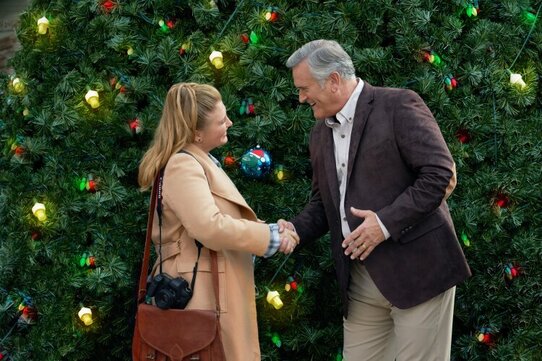
Caution: This article contains spoilers for the motion picture, ‘My Southern Family Christmas’.
The holiday season truly is a time for family. Where we gather round the dinner table or at various activities to just… be together and reminisce about days gone by or look forward to days ahead, as a family. So that we receive all the love and warmth, and support we need during this critical time of year, where reflection and celebration also rule the day. But while so many of us head home and don’t think twice about it because that is just how the holiday season goes, we need to be mindful of the fact that our sometimes frustrating and exhausting experiences in going home, or joyous in nature, because we get to see those, we love, isn’t a consistent experience during the season. For there are some who are heading into the holiday season, mourning the loss of a family member which is hard and there are others… who simply don’t spend time with their family for various reasons. It could be because their family is toxic, or because they have yet to spend time with them. For perhaps they were given up as a child and only know of the existence of their parents from afar, which is no easy place to thrive, and that is why it is important during the season… to not only be grateful for what we have, but to put ourselves in the shoes of those that long for what we have. To have a proper understanding of worlds we don’t fully understand, and to see how we can help those in search of family cope during the season, and it just so happens that a recent Hallmark Channel release works to do just that in My Southern Family Christmas. A feat that this story accomplishes by introducing us to a reporter named Campbell. Who despite having a great and successful career and a family that loves her, is longing. For she has never known her biological father, Everett Bergeron, who left years ago and is constantly on her mind, and oddly enough… she just so happens to be in his thoughts as well, despite him not knowing much about Campbell and her path. To the point where his wife searches for Campbell and locates her and contacts her, to try and bring this duo together, which Campbell is of course hesitant about. But a chance to write a story about her father becoming the new Pere Noel of his quaint Louisiana town, might give her the chance at last to finally spend time with her father and find the bond they never had in her youth. Provided of course, she can muster the courage to tell him who she really is and how badly she wants him in her life. 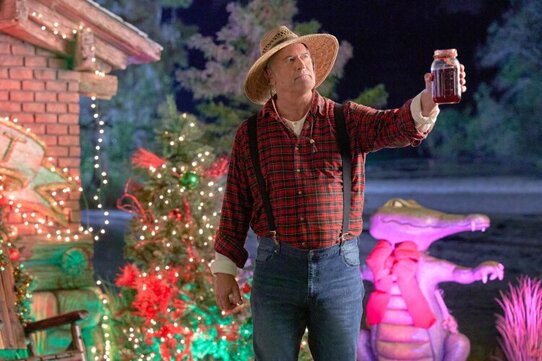
Which is… the perfect way to put us in someone else’s shoes. Because by traveling through Campbell’s eyes… we are indeed privy to the different kind of holiday season that exists for others. Since she does spend a lot of time during the season, pondering on what it would feel like to have a complete relationship with someone that she knows she is connected to, and that leads to some wonderfully powerful moments for certain. The kind that provides us with an understanding of longing and the need to belong and of course, it also speaks to the need to support one another during the season if we know someone in this situation, so the hurt doesn’t overwhelm. Or in this case, to see how we can help them obtain the fulfillment that everyone involved is searching for.
Because this is a Hallmark Channel movie and happy endings are a staple, but make no mistake about it, the overall plot and subject matter, make this a vastly different kind of Hallmark story. Since it genuinely covers a bevy of deep and important topics that go beyond Cameron’s plight. For this is also a story that dives deep into the power and importance of communication and honesty. And how not communicating with the people that matter to us and not being honest with them, or ourselves for that matter, stunts us and creates more strife. Since Campbell and Everett could have solved a great deal of their suffering with honesty in this particular tale and being honest with themselves would have gone a long way as well, which are lessons that already add to a supremely engaging and meaningful story. One that also works because of the performances present here. Because Jaicy Elliot, who plays Campbell, sells the realism of the character and her internal pain. Allowing for us to easily connect with her and the story, and she isn’t the only one that shines here. For Bruce Campbell, who plays Everett, brings his A-game to this particular role. Adding a magnificent depth and complexity to the character and at times… he plays the character with such a raw honesty that you forget you’re watching Campbell act and believe you’re experiencing Everett’s emotions in person. If anything, all of these elements make this a delightful holiday watch, simply because… this really is a refreshing and unique Hallmark Holiday Movie. One that tackles fresh subject matter and features depth and humanity and a perspective that truly reminds us of the power of the season and the wonder of family.
0 Comments
Written by John Edward Betancourt 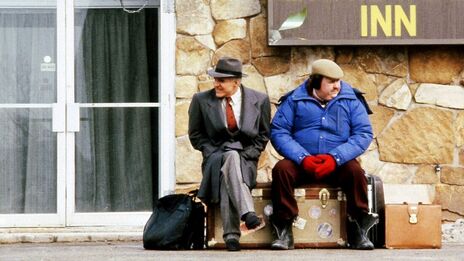
Thanksgiving truly is a wonderful time when it comes to family and friends. The chance to sit down and see those we love, enjoy an incredible meal and be thankful for the people in our lives makes for a wonderful weekend. It's a holiday that is truly about unity and family and well, let's be honest, mountains of turkey, and for the most part we leave the weekend feeling full and content.
But there is a dark side to the holiday. No, not an awkward family member that perhaps has had too much to drink, that usually results in great stories we later tell our friends. No, the part that we don't discuss about Turkey Day is the travel portion of it. The rush to get to our destination and the hassle that can come with it and it is that darker side to Thanksgiving that is explored in hilarious detail in what is one of John Hughes' finest films... Planes, Trains and Automobiles. Neal Page has one simple goal on his mind for Thanksgiving, to get home and enjoy a quiet and lovely weekend with his family. But unfortunately for Neal, fate has other plans in mind for him. A terrible snow storm is keeping every single plane from landing in his hometown, forcing Neal to find a new way to get home, and whether he likes it or not, he will have an obnoxious companion named Del Griffith to help him along on his journey. 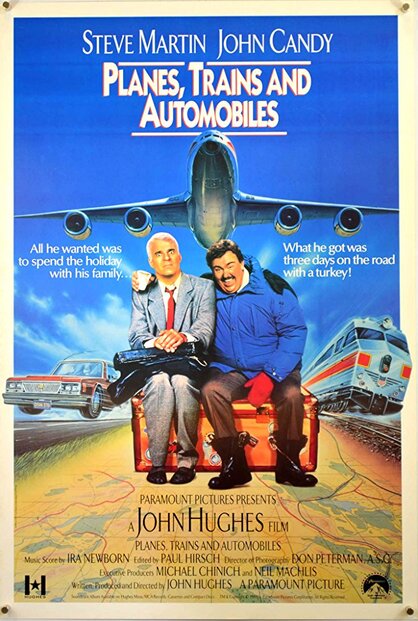
So, how does such a simple plot earn its prestigious status as one of John Hughes' finest films? That's easy, by way of its characters. This is one of those rare films where the perfect cast is put into play, courtesy of Steve Martin and the late John Candy. Steve Martin is spot on as Neal, an anal retentive, no nonsense fellow who is always on his way from A to B and he is perfectly juxtaposed by John Candy's portrayal of Del Griffith. Del is a slob through and through, and one who lives in the moment without a plan, something that is evident when he decides it is upon him to get Neal home to his family.
These two actors electrify the screen with perfect comedic timing and, some stunning performances. In fact, this goes down in my mind as John Candy's finest work. Simply because of how many layers Del Griffith manages to have in the film, especially when we learn the big secret about Del's life and the true motivation as to why he was so intent on Neal spending time with his family. That beautiful and tragic reveal changes the feel of the film entirely, suddenly taking it from hilarious comedy to touching family film that speaks to how important it is to spend every moment with those we love. It's a magnificent film really, and one that requires multiple viewings to say the least. In part to catch the jokes you've already missed from laughing so hard, and because this is just a wonderful film through and through that gets better with every single viewing because we can relate to so much on screen. We've all had our flights cancelled, dealt with screw ups or been on the road in places we have never wanted to be in order to get home to our family. See this one if you haven't and if you have watch it again, preferably with those you love as a reminder of just how lucky we are to have them in our lives. Written by John Edward Betancourt 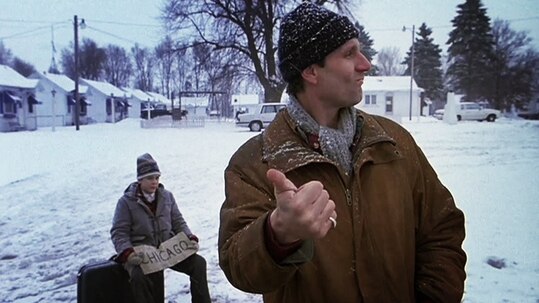 When one thinks of Thanksgiving, certain images come to mind. There’s always a family in those images, sitting around the table with all of the fixings ready to roll, and everyone is smiling and laughing as they wait for the bird to arrive and once the turkey is placed upon the table and the father of this family slices it up, everyone can feast and chat and enjoy one another’s company for this is indeed a day designed to celebrate unity and give thanks for the family we’ve been blessed with and well, that really is a beautiful image to have when it comes to this sacred holiday. However, that Norman Rockwell-esque vision of an Americana Thanksgiving isn’t always the reality when it comes to this holiday. Some folks celebrate the holiday alone, or away from their family with friends by way of a good old-fashioned Friendsgiving. Or, some families celebrate the holiday multiple times in the day because their core unit is no longer unified because of divorce. But whether you celebrate the holiday or not, what matters more on this day is that we do we indeed give thanks for what we have because in some form or fashion, we’ve been gifted with something wonderful in life and in 1991, a unique take on Thanksgiving and its overall meaning was explored by way of a movie named Dutch. Now in this particular film we are introduced to an everyday guy named Dutch Dooley, who is doing pretty well for himself. He owns his own construction company, he’s dating a lovely woman named Natalie, and in order to show Natalie how much he cares for her, he offers to step in and help with a minor family problem involving her son from another marriage. Because if someone doesn’t head down to young Doyle’s school to pick him up for Thanksgiving, he’ll spend the holiday alone since his father will be away on business and while this seems like a simple task for Dutch, the spoiled brat that he meets in Doyle when he arrives at the little snob’s school means that he is going to be in for quite the ride back home, one that will likely change both Doyle and Dutch’s lives forever… 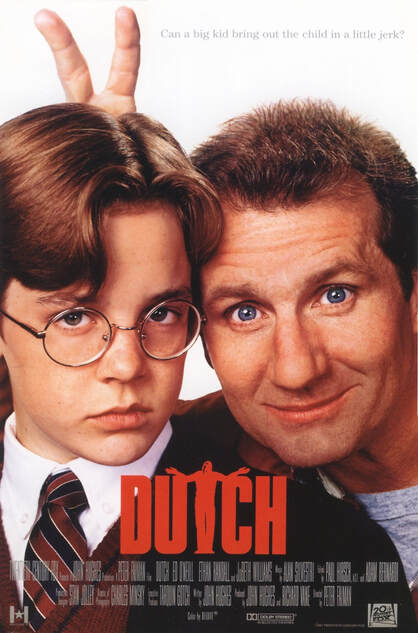 So, when this film was originally released in ’91, it was a critical dud and a box office bomb and well, I’m honestly not sure why because it actually has a lot to offer. First and foremost, the performances from Ethan Embry and Ed O’Neill, who play Doyle and Dutch respectively, are downright solid to say the least and their acting lays down the foundation for a surprisingly deep and powerful story about family, the holiday in question and what it means to be decent to one another, and those elements in my eyes, make this quite the beautiful film when all is said and done because it reminds us that the notion of family is fluid and that sometimes we choose who becomes part of our family and when they’re the right kind of person who can influence us, they can teach us wonders about the world. Because despite Doyle’s garbage attitude toward Dutch for most of the movie, Dutch inadvertently reaches the young man without him knowing it, assuming the role of the father in this story and he’s able to help a hurt young man to open up in the process and well, Doyle learns a lot about the world because of this, and in turn, comes to understand what the holiday means as the story progresses in that, it’s about being grateful sometimes for just being able to walk upon this earth and it’s also about being thankful for having people to share our lives with in any capacity and it’s wonderful to watch Doyle slowly grow via Dutch’s life lessons and see him finally shed the brat persona that engulfs his soul when we first meet him in the film. However, as is tradition with films written by John Hughes, there’s plenty of comedy to be found here as well, and that’s really what makes the film so endearing, for a lot of the comedic moments here are supremely down to earth and relatable and downright hilarious and well, when all is said and done, this really is quite the lovely little film. It’s got heart, it’s got laughs and it has beautiful meaning for the audience, if they so choose to embrace it and it’s one that I definitely recommend you see if you haven’t had the opportunity to do so since it offers a unique perspective on Thanksgiving and the wonder that comes with this special day. Written by Zeke Perez Jr. 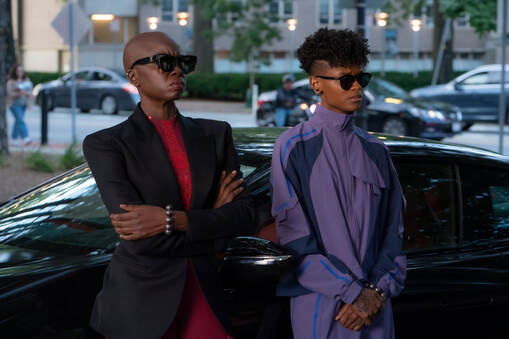 (L-R): Danai Gurira as Okoye and Letitia Wright as Shuri in Marvel Studios' BLACK PANTHER: WAKANDA FOREVER. Photo by Eli Adé. © 2022 MARVEL. (L-R): Danai Gurira as Okoye and Letitia Wright as Shuri in Marvel Studios' BLACK PANTHER: WAKANDA FOREVER. Photo by Eli Adé. © 2022 MARVEL. Caution: This article contains minor spoilers for the motion picture, ‘Black Panther: Wakanda Forever’. In an emotional, enthralling, and action-packed new chapter, Black Panther: Wakanda Forever closes out Phase Four of the MCU on a high note. While much of Phase Four felt like it was treading water without solid threads of continuity in its movies and shows, this entry felt like a return to the reigned in, purposeful sagas from before. A lot was expected of Wakanda Forever. The first Black Panther had the sixth highest grossing opening weekend of all Marvel films and remains the third highest grossing Marvel film across its lifetime, pointing to not only the initial appeal of the character, but the fanfare and staying power that followed. It excelled in its worldwide reach and was praised for its acting, soundtrack, role in the broader Marvel universe, storyline, and representation. This film was tasked with building on the cultural impact of the first movie, upping the ante and moving the MCU forward to set up Phase Five, tying together several loose ends from the movies and shows that hadn’t yet paid off, and providing closure on T’Challa. While there are moments that feel rushed along or dropped in solely to accomplish some of these goals, it does each of those things extremely well. First and foremost, the film masterfully serves as a farewell to a deep character, a great actor, and an even greater human. Chadwick Boseman was the heart and soul of the franchise, and Wakanda Forever takes its time to pay its respects. The crux of the film is bookended by the cold open and Marvel Studios intro reel and the mid credits scene, all of which provide what feels like both a sendoff to the character of T’Challa and a genuine tribute to Boseman. It’s evident how much Boseman meant to this franchise, and Ryan Coogler and the cast honored his memory in a fantastic, authentic way. With Boseman’s death, the story was taken in a different direction as the mantle of the Black Panther was freed up. This sequel shows how T’Challa’s family and all of Wakanda deal with the loss. It uses this as a vessel to explore how the characters we’re familiar with each deal with grief and mortality. Queen Ramonda and Princess Shuri take the loss the most directly, each battling between compassion and vengeance in how they view the world. A trip to the Ancestral Plane reveals a tilt in this battle that proves pivotal for the finale of the movie - and potentially for the MCU as a whole. 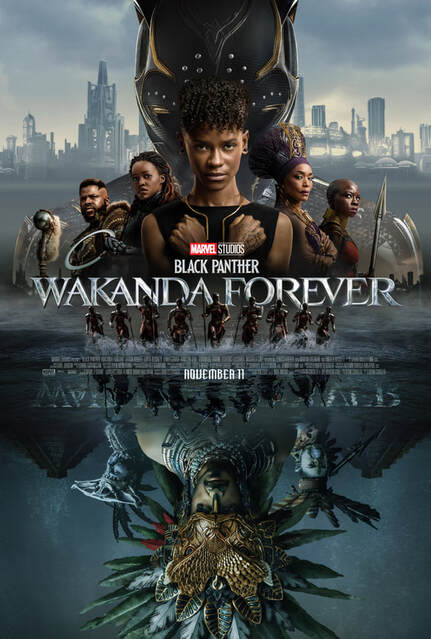 We revisit several other characters from Black Panther and the MCU. To name a few (barring surprises or spoilers): Nakia deals with the grief through distance. We find that she has spent her time away from Wakanda following the Blip and following T’Challa’s death, seeking space from the community. Okoye remains in Wakanda as part of the Dora Milaje, dealing with her own role in the society. M’Baku is back, serving as both solid comic relief and as an important advisor from the Jabari Tribe on key matters for Wakanda’s approach to world affairs. Wakanda Forever introduces several new characters that could serve in vital roles in the MCU, including a certain key puzzle piece for the Young Avengers. Additionally, the film’s main antagonist, Namor or K’uk’ulkan, provides an interesting and important take on the character. Traditionally, Namor is a superhuman hailing from Atlantis. This movie’s Namor shares some of the qualities of the source material, but is integrated into the storytelling of the Black Panther universe. He brings his own mythos, built upon Mayan civilization and folklore. Even his name is adapted, swapping emphasis on the pronunciation (“sin amor”, without love) to add a rich cultural component. Further mapping out Black, Latin American, and Indigenous characters in the storytelling adds to the worldbuilding that made the first movie so special. Namor is also well rounded in his motivation and conflict. With superhero movies, we’re constantly treated to clashes of the titans. Equally matched heroes and villains go toe-to-toe or superteams erupt in civil wars. But something about the battle between Wakanda and Talokan here feels even more colossal. The world below feels like an immediate threat, not just because of brute force, but because of its intellect and technology. The antagonists don’t necessarily come from a place of pure villainy, either. Instead, Namor leads his people through the same challenge that confronts Wakandans; what is their place and how do they handle the outside world? The similarities of these two civilizations, rather than their differences, make the story much more intriguing. Considering the sights and sounds, Wakanda Forever stacks up nicely to its predecessor. The soundtrack may be a little more understated that Kendrick Lamar’s up-tempo masterpiece that featured in the first movie, but it fits the tone of the story extremely well, building around a staple track by Rihanna (“Lift Me Up”) and a phenomenal score. The score amps up the intensity of a number of action scenes, particularly the suspenseful underwater scenes early on. Visually, the underwater scenes shine, too. The interplay between land and sea is stunning. One breathtaking moment sees the Jabari Tribe and the Dora Milaje working together off the side of a ship, plunging down into the sea. The cityscapes of Wakanda and the underwater world of Talokan provide vast backdrops for much of the action. While Wakanda Forever shows how expansive the MCU has become, carrying a few subplots that feel forced in because they were introduced four movies and three TV shows ago and must finally be put somewhere, it also does a lot of good. It starts to connect some of those dots that haven’t had a payoff, making us eagerly countdown to the next release date. It shows us how powerful a fictional world can be. And it reminds us why we love these movies and the actors that bring these characters to life. While it’s impossible to replace a character, Wakanda Forever carries on a legacy. We’ll miss you, King T’Challa. Thank you for everything, Chadwick Boseman. |
Archives
March 2025
|
|
© 2012-2025, Nerds That Geek LLC.
All Rights Reserved. |
uWeb Hosting by FatCow


 RSS Feed
RSS Feed